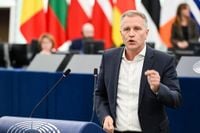On April 1, 2025, the European Parliament made headlines by revoking the immunity of German MEP Petr Bystron, a member of the far-right Alternative for Germany (AfD). This decision came as a response to a request from the Munich public prosecutor's office, which sought to investigate Bystron for allegedly using symbols associated with unconstitutional organizations.
The controversy surrounding Bystron dates back to July 2022, when he shared a photo collage on social media that depicted various politicians appearing to give a Nazi salute. The post, which was made on what was previously known as Twitter, included the caption "German politicians wave goodbye!" and followed the announcement that Ukraine's ambassador to Germany, Andriy Melnyk, would be leaving his post. This provocative imagery and accompanying text drew significant backlash and raised questions about Bystron's political rhetoric.
In addition to the allegations surrounding the Nazi salute, Bystron is also facing a separate investigation into bribery claims connected to payments from the sanctioned Russian-backed news network, Voice of Europe. However, this investigation has been stalled due to his parliamentary immunity. The recent vote to waive his immunity pertains specifically to the tweet in question, as confirmed by the European Parliament to Euractiv.
Public prosecutors in Munich have indicated that they have also requested a waiver for the bribery investigation, stating, "once a decision has been made by the European Parliament, the Munich Public Prosecutor General's Office will decide whether to reopen the investigation." The European Parliament's Committee on Legal Affairs is set to discuss this matter further in their next session on April 9, 2025.
Bystron's case is not isolated; on the same day, the European Parliament also lifted the immunity of three other MEPs. Two Polish parliamentarians, Mariusz Kamiński and Maciej Wąsik, both from the national-conservative PiS party, are facing accusations of not adhering to a ban on holding public office. Meanwhile, Czech MEP Jana Nagyova (ANO) is under investigation for subsidy fraud.
As the political landscape in Europe continues to evolve, the implications of these investigations and the actions of the European Parliament may resonate beyond the immediate cases. The discussions surrounding political accountability and the use of inflammatory imagery in political discourse are more relevant than ever.
In a different arena, the services union Verdi is gearing up for a crucial round of negotiations regarding public sector pay and conditions. Following a mediation committee's recommendations, Verdi will meet for the fourth round of talks on April 5, 2025, as they represent approximately 2.5 million public-sector workers in Germany.
The negotiations have been marked by regular warning strikes across various sectors, including refuse collection, early childhood education (kitas), clinics, and public transport. Despite ongoing discussions, an agreement has yet to be reached, prompting the involvement of arbitrators on March 17, 2025.
On March 28, mediators proposed a three percent pay rise effective from April 1, 2025, and a further 2.8 percent increase from May 2026. Additionally, employees who do not work in clinics or nursing homes would have the option to exchange parts of their annual bonus for extra days off, and all public-sector workers are set to receive an additional day off starting in 2027.
As the talks progress, Verdi has not ruled out the possibility of holding a members' ballot to decide on unlimited strikes if negotiations do not yield satisfactory results. The upcoming discussions in Potsdam will be critical in determining the future of public sector employment conditions.
Meanwhile, the German Interior Ministry recently announced that the country has made significant progress in limiting irregular immigration. Interior Minister Nancy Faeser highlighted that the number of asylum applications in the first two months of 2025 was 43 percent lower than the same period in 2024, and 51 percent lower than in 2023. The total number of asylum applications recorded was 229,751.
Deportations have also risen consistently, with over 20,000 deportations executed last year alone. Germany has implemented stricter border controls since 2015, initially along its border with Austria and later extending to its borders with Poland, the Czech Republic, and Switzerland. As of September 2024, these controls have been applied to all land borders, including those with France, Luxembourg, Belgium, the Netherlands, and Denmark.
The topic of immigration has been particularly contentious in recent months, especially in light of the far-right AfD's gains in the February elections, which were partly fueled by public concern over asylum seekers and related violence. Friedrich Merz, the victorious CDU/CSU candidate for chancellor, has called for a radical crackdown on migration, proposing that all undocumented foreigners be turned away at the border. However, the coalition talks with the center-left SPD have highlighted differing approaches to immigration policy, with calls for coordination with neighboring countries.
In another significant development, German Foreign Minister Annalena Baerbock accused Russian President Vladimir Putin of stalling negotiations aimed at halting the ongoing conflict in Ukraine. During a visit to Kyiv on April 1, 2025, Baerbock stated, "He is manoeuvring his way out of negotiations, continuing his illegal war of aggression and escalating with brutal, threatening attacks on houses." She emphasized the need for a genuine peace process, asserting that "there will only be a real and lasting peace when the Russian president realizes that he cannot win this war."
Baerbock's comments come on the heels of an agreement between Ukraine and the United States for a 30-day ceasefire with Russia, which Putin has reportedly rejected. This ongoing conflict continues to shape international relations and provoke strong reactions across Europe.
Lastly, Berlin authorities are reportedly pursuing the deportation of four young foreign residents for their involvement in pro-Palestine protests, according to a report by The Intercept. Internal emails revealed that Berlin's immigration office attempted to block deportation hearings, but pressure from the interior ministry led to the continuation of these proceedings.
Among the defendants are three EU citizens and one US citizen who identifies as trans, expressing fears of returning to the US. This situation has drawn comparisons to the previous US administration's deportation policies aimed at suppressing social movements, raising concerns about civil liberties and political expression in Germany.
As these various issues unfold, the political landscape in Germany and Europe remains dynamic, with significant implications for public policy, civil rights, and international relations.





